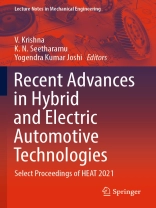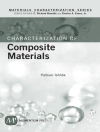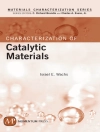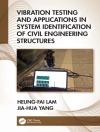This book presents the select proceedings of International Conference on Hybrid and Electric Automotive Technologies 2021 (HEAT 2021). It cover recent innovations in electric and hybrid-electric vehicles and autonomous vehicles. Various topics covered in this volume are batteries, battery cooling methodologies, use of nano-coolants, electrified powertrain systems and components, hybridisation infrastructure, energy storage, and many other topics of importance to the industry. The book will be useful for researchers and professionals working in the areas of automobile and vehicle engineering.
Table des matières
Production of biodiesel using temple waste oil.- Production of Cotton Seed Biodiesel and its usage in a C I engine with M ethyl Ester and Al2O3 Additives.- Development of Drive Cycle and Resultant Powertrain Calculations of Electric Bicycle.- Placement optimization for field effect transistors.- Aerodynamic effect on lift characteristics of a sedan car due to attached wing.- Dynamic analysis of Electric Train Bogie using MATLAB Simulink.- A Simplified Thermal Model to Predict Temperature Profile and Heat Generation of Cylindrical Lithium-Ion Cells.- A numerical investigation for heat transfer enhancement of synthetic jet using different orifice geometry.- A Waypoint Tracking Controller for Autonomous Vehicles using CARLA Simulator.- Electro-Thermal model for Field Effective Transistors.- Estimation of Tire Cornering Properties using Experimental Modal Parameters, GPS data and Finite Element Model.- An Automatic Indian Traffic Signs Detection and Recognition System using Open CV.- Design and Analysis of Skateboard Chassis.- Estimation of Tire Scaling Coefficients and Simulation of on-Road Vehicle Behaviour.- Liquid Cooled Battery Thermal Management System for 3S2P Li-ion Battery Configuration.- Multivariable Load Prediction Using LSTM.
A propos de l’auteur
Dr. V. Krishna is a Professor in the Department of Mechanical Engineering and Dean, Student Affairs, PES University, Bangalore. He obtained his B.E. (Mechanical) from Bangalore University and Master’s degree from Birla Institute of Technology, Mesra, Ranchi. He has received his Ph.D. from Visveswaraya Technological University, Belgaum, India, for his thesis on ‘Investigations on Cryogenic Heat Exchangers’. He started his academic career in March 1993 and has over 28 years of experience in teaching, research, consultancy and administration. He is the chief course instructor for courses such as engineering thermodynamics, mechanics of fluids, modelling and analysis of heat exchangers, turbomachines, and heat and mass transfer. He is reviewer for Heat Transfer Engineering published by Taylor and Francis, International Journal of Heat and Mass Transfer published by Elsevier etc. Dr. V. Krishna specializes in the Thermal Engineering Domain and is the Head of the Process Modelling Research Laboratory (PMR Lab) which focusses on cutting edge research in the field of process modelling and its allied areas. He has over 24 publications in peer-reviewed international journals (10) and conferences (14). He has been an invited speaker and chair at numerous national and international conferences. Dr. V. Krishna was invited as Visiting Professor at Technologico de Monterrey, Mexico from 25th to 31st August, 2018. He visited two of its campuses at Toluca and Puebla. During this period, he took a course on ‘Automobile Radiators-an Inside Story’ and also presented seminars on ‘Drivers for Sustainable Energy in the Automobile Industry’ and ‘Introduction to Internal Combustion Engine’. He has also visited a number of universities in UK in 2013, as part of a tour to look at the best practices and possible collaborations. Dr. V. Krishna is also an accomplished mridangam artiste and has accompanied top musicians across India in numerous Carnatic music concerts.
Professor K. N. Seetharamu, known to his colleagues and students simply as KNS, was a leading computational heat transfer expert. He transformed this area of research in India and elsewhere through his simplified approaches and the use of finite element method. KNS received his undergraduate degree in mechanical engineering from Mysore University in 1960 before earning his Master’s degree in power engineering and Ph D in heat transfer, respectively from IISc Bangalore in 1962 and IIT Madras in 1973. After a brief stint in Industry and BIT Ranchi, KNS started his three decades of academic career at IIT Madras until 1998. Between 1999 and until his death in January 2022, he carried out research and taught engineering students in various universities including University Sains Malaysia (1998-2005), MS Ramaiah School of Advanced Studies, Bangalore (2005-2006), Sri Bhagawan Mahaveer Jain College of Engineering Bangalore (2006-2007) and PES University, Bangalore (2007 – 2022). During his career, KNS formally graduated 57 postgraduate research students and informally helped many others to earn research degrees. He also published 455 articles including 207 journal articles and with total citations exceeding 7000. After a significant contribution to boiling heat transfer in his doctoral work , KNS started working in the area of the finite element method in the early eighties. The finite element research in heat transfer was significantly enhanced by his research visits to Swansea University and fruitful collaboration with senior academics in Swansea. He made the discrete systems approach (a precursor to full finite element method) very popular in heat transfer through his works in heat conduction, flow through pipe networks, heat exchangers and heat transfer enhancement. He continued such a simple but effective approach to energy and momentum balance in various applications throughout his research career. Dr. Yogendra Kumar Joshi is Professor and John M. Mc Kenney and Warren D. Shiver Distinguished Chair at the G.W. Woodruff School of Mechanical Engineering at the Georgia Institute of Technology. He obtained his B.Tech. from Indian Institute of Technology Kanpur and M.S. degree from State University of New York, Buffalo. He has received his Ph.D. from University of Pennsylvania in the year 1984. His research areas include heat transfer, combustion, and energy systems; micro and nano engineering; and thermofluidic issues in emerging technologies and microthermal systems. His research interests are in multi-scale thermal management. He is the author or co-author of nearly four hundred publications in this area, including nearly two hundred journal articles. Prior to joining Georgia Institute of Technology in 2001, he held faculty appointments at the University of Maryland at College Park (1993-2001), and Naval Postgraduate School (1986-1993). He has served as the Principal Investigator for multiple Defense Advanced Research Projects Agency (DARPA) programs, and Office of Naval Research Consortium for Resource-Secure Outposts (CORSO). He was Site Director for the National Science Foundation Industry/University Cooperative Research Center on Energy Efficient Electronic Systems. He has held visiting faculty appointments at Stanford University, Katholieke Universiteit Leuven, and Xi’an Jiaotong University. He is an elected Fellow of the ASME, the American Association for the Advancement of Science, and IEEE. He is a recipient of many distinguished awards such as the ASME Electronic and Photonic Packaging Division Outstanding Contribution Award in Thermal Management, ASME J. of Electronics Packaging Best Paper of the Year Award, IBM Faculty Award, IEEE Semi Therm Significant Contributor Award, ASME Inter Pack Achievement Award, ITherm Achievement Award, and ASME Heat Transfer Memorial Award.












